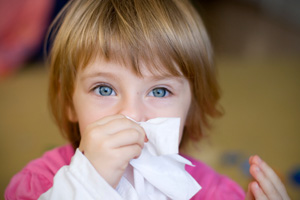
A recent announcement from the White House warned that up to 50% of the U.S. population could come down with H1N1 or swine flu this upcoming flu season. This may sound alarming, but keep in mind that this estimate is on the high end -- and most cases will be no more severe than your usual winter flu*.
What does this mean for you?
H1N1 spreads pretty much the same way the normal flu spreads: Through contact with sick people, coughing and sneezing, and contact with surfaces that have flu virus on them.
With college students heading back to campus, children back to school, and colder weather looming, now is the important time to start taking steps to keep you and your family safe and healthy. In most cases special vaccines or antibiotics are not needed. A simple review of some sickness-prevention strategies can prevent this from getting out-of-hand.
1. Cover your mouth and nose with a tissue when you sneeze.
OK, everyone knows to do this … right? Then why do I still see so many people just letting their sneezes loose? Use a tissue or napkin and throw it away immediately afterwards. If a tissue isn’t available, sneeze into the inside of your elbow — not in your hands.
2. Wash your hands regularly.
Another reminder you can never hear too many times. Use soap and water or an alcohol-based hand cleaner. Washing hands is especially important after sneezing or coughing, before handling food, or after spending time in a public place.
3. Don’t touch your face.
Keep your hands away from your mouth, nose, and eyes. This is hard to do, but at least try to be aware if you’re doing it often. See above and wash frequently if you can’t keep your hands off yourself.
4. Get some sleep.
Having a regular and appropriate sleep schedule is one of the best ways of keeping your immune system strong and staying healthy. The National Sleep Foundation recommends 7-9 hours per night for adults.
5. Be wary of surfaces — clean them regularly.
Tables, chairs, countertops, desks, computer keyboards, doorknobs … pretty much everything you touch on a regular basis. Most common household disinfectants should work fine to keep them germ-free.
6. Exercise.
A sure way to make sure your body is strong and ready to fight infection is to stay active. Make exercise a part of your daily routine to cleanse toxins from your body and release stress.
7. Eat well. Maintain a diet full of immune boosting foods and high in Antioxidants, such as vegetables, fruits, and whole grains.
8. Drink well.
Have plenty of water to flush toxins from your system. Fruit juice rich in vitamin C is a good choice as well. Avoid alcohol — it’s an immune suppressant.
9. Stay away from sick people.
A few feet should do it. Just stay far enough away from sick friends to be out of range of saliva, snot, and other potential disease-carrying fluids.
10. Get help when you need it.
If you start experiencing flu-like symptoms such as fever, coughing, sneezing, chills, body aches, etc., call your doctor. Do your co-workers or classmates, and yourself, a favor by staying home for at least 24 hours — except to see a doctor.
11. Stay calm.
There’s likely to be plenty of swine flu coverage in the media over the next few months, but nothing does your body more of a disservice than unnecessary stress and panic. If we’re smart, cautious, and relaxed, we have little reason to fear.
*Editor's Note: For comparison, the Center for Disease Control reports that in a typical year, 20% of the U.S. population gets the flu and over 200,000 people are hospitalized from flu-related complications.
No comments:
Post a Comment